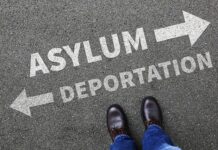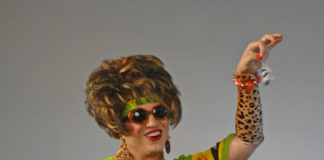NEWPORT — Even before the COVID pandemic, Daniel Cano-Restrepo said the LGBTQ community in the city had felt estranged.
“There is a community out there, it’s just somehow disconnected,” Cano-Restrepo said. “A gay bar or an LGBT establishment, of course there is a need for that, and the community will respond to that place.”
Cano-Restrepo and his partner, Sean O’Connor, run NewportOUT, a website dedicated to marketing Newport as a tourism destination to LGBTQ travelers. Although several bars host events for the community, the two said the area still needs a space to socialize and express themselves.
“It would certainly be a huge asset for the community, not only locally, but for, you know, that travel tourism aspect of things,” O’Connor said.
Several gay bars have opened and closed in the city, but there has not been one in operation since 2006. The last one, Castaways, was open for just two years at the former location of the city’s longest-running gay bar, David’s, which had closed years before.

Lionel Pires, the owner of Castaways, remembers when more than one gay bar dotted downtown Newport, drawing in tourism from the LGBTQ community in the late 1970s and early 80s. Back then, he said, Easton’s Beach was predominately populated by gay men and women.
“The bars here were busy, really, really busy,” Pires said. “But of course, that was right at the beginning of the AIDS epidemic, which really changed everything. It’s hard to put into words how devastating it was to the whole gay community. But here, it was a very small town and there were a lot of locals who died and unfortunately, they died quietly, a lot of them in shame.”
Tragically, one of those who passed away was David Lilly, who owned David’s. After David’s was sold, Pires said the community was left without a home in Newport. Around 1995, Pires attempted to buy the building, at 28 Prospect Hill St., and reestablish a gay bar.
The effort to establish a bar in that location was rife with barriers, from neighbor complaints about having a bar in the area to struggles obtaining a liquor license from the City Council, an issue eventually picked up by local news outlets.

Ultimately, Pires did open Castaways, but a week after the bar opened, someone smashed the windows to the place while Lionel and his partner slept upstairs. “It terrorized the community,” he said. “The whole community felt like we were targeted. Awful. It was awful.”
After two years, during which the bar hosted parties, events, women’s nights and weathered regular visits from police over false noise complaints, Castaways closed in 2006, unable to keep up with a recently opened dance club in Middletown, Pires said.
“There were people in their early 20s to who it was like their second home,” Pires said. “I mean, it was a community, and they had never had it, and so this was the first time that existed, and they were good patrons.”
For about 15 years, Pires said he has been wanting to create an LGBTQ space in Newport, mainly some form of private club for the LGBTQ community that could be run by a nonprofit. However, he said he’s having difficulty finding people willing to sit on the board of directors.
“I feel like if the gay community doesn’t do something about it … then this opportunity will be gone for us,” Pires said. “I worked for a long time with Discover Newport to try to increase gay tourism here and one of the issues with that is, if there isn’t a bar, people aren’t going to come. Because even if you do the mansions or whatever, there’s nothing to do after.”
He envisions the space as a cultural center that could turn into a bar. He said this kind of club could fit more of the needs for the diverse people under the LGBTQ umbrella.
As someone who identifies as nonbinary, Newport Health Equity Zone strategy specialist Rex LeBeau said although they would like to see a gay bar in Newport, they agree a traditional gay bar would not necessarily fit the needs of the entire community.
Most gay bars cater specifically to gay men or feature bathrooms separated by gender, which can be discouraging to transgender and nonbinary people.
Additionally, since bars have been the main hosts for LGBTQ events in Newport, it can be difficult for LGBTQ Newporters who struggle with substance abuse to attend community events.
“It’s not a fully sort of inclusive space,” LeBeau said. “Being queer is hard and a lot of people use things as coping mechanisms, whether that’s smoking, or drinking, or weed to reduce anxiety … So especially for the folks that are in recovery, events happening at a bar are going to be prohibitive in some ways.”
Like Pires, LeBeau has worked to establish LGBTQ resources in Newport with the Newport Health Equity Zone and Channing Memorial Church. Lebeau said the only consistent space for LGBTQ socialization in Newport has been the Gay-Straight Alliance at Channing Memorial Church.
“Because Newport doesn’t have the infrastructure or mindset, programs, spaces to make people feel welcome and safe and find people like them, queer folks have to look elsewhere,” LeBeau said. “Providence is a real beacon for that because there’s a huge amount of diversity in Providence in terms of what organizations are queer friendly.”
Pires said he hopes to see some sort of LGBTQ space return to Newport, if not created by him, then created by the next generation.
“Isolation is suffering,” Pires said. “You have a community here that is isolated. You’re online, but it’s not an organic thing. You don’t see the people, you know … it’s just about finding the people who are going to say, ‘Yeah, we’re gonna make this work.’”







